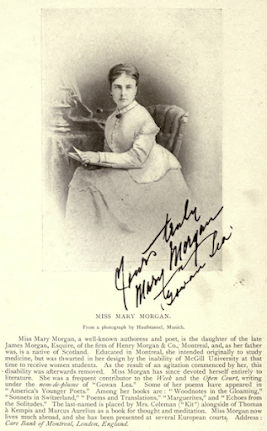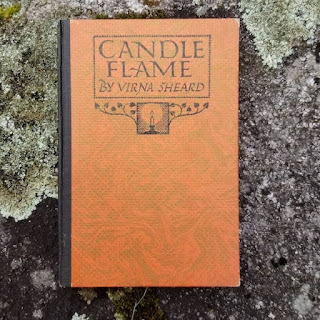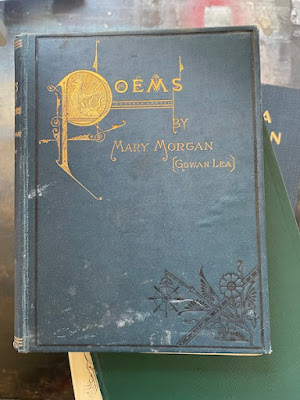01 May 2022
Is This the Dominion's Only Goose Girl Poem?
28 April 2022
Ten Poems for National Poetry Month, Number 10: 'April' by Mary Morgan
A final poem for National Poetry Month, 'April' comes from the pen of Mary Morgan, daughter of James and Catherine Morgan, niece of Montreal merchant king Henry Morgan of the Henry Morgan Company. The brief biography included in Types of Canadian Women by Henry James Morgan (no relation, I believe) suggests a life of both privilege and constraint.
 |
| cliquez pour agrandir |
'April' is found in Poems and Translations (Montreal: J Theo Robinson, 1887), her first volume of verse.
APRIL
Thou balmy April evening,I love thy beauty rare;The clouds obscure the heavens,A star shines here and there.The breath of love is fillingThe zephyrs as they blow;The fragrance of the violetIs wafted from below.O for a strain of musicTo suit the pensive hourSome cadence low and tenderTo lell its soothing power!
Du feuchter Fruehlingsabend,Wie hab' ich dich so gern!Der Himmel wolkenverhangen,Nur hie und da ein Stern.Wie leiser LiebesodemHauchet so lau die Luft,Es steiget aus allenTalen Ein warmer Veilchenduft.Ich moecht' ein Lied ersinnen,Das diesem Abend gleich,Und kann den Klang nicht finden,So dunkel, mild und weich.
You damp spring evening,How I like you so much!the sky overcast,Just a star here and there.Like a gentle breath of lovebreathe so lukewarm the air,It rises from all valleysA warm violet scent.I want to think up a songThe same this eveningAnd can't find the soundSo dark, mild and soft.
25 April 2022
Ten Poems for National Poetry Month, Number 9: 'My Own Canadian Girl' by W.M. MacKeracher
The demoiselles of sunny FranceHave gaiety and grace;Britannia's maids a tender glance,A sweet and gentle face;Columbia's virgins bring to kneeFull many a duke and earl;But there is none can equal thee,My own Canadian girl.Thy hair is finer than the flossThat tufts the ears of corn;Its tresses have a silken gloss,A glory like the morn;I prize the rich, luxuriant mass,And each endearing curlA special grace and beauty has,My own Canadian girl.Thy brow is like the silver moonThat sails in summer skies.The mirror of a mind immuneFrom care, serene and wise.Thy nose is sculptured ivory;Thine ears are lobes of pearl;Thy lips are corals from the sea,My own Canadian girl.Thine eyes are limpid pools of light,The windows of thy soul;The stars are not so clear and brightThat shine around the pole.The crimson banners of thy cheeksTo sun and wind unfurl;Thy tongue makes music when it speaks,My own Canadian girl.God keep thee fair and bright and goodAs in thy morning hour,And make thy gracious womanhoodA still unfolding fiow'r.And stay thy thoughts from trifles vain,Thy feet from folly's whirl,And guard thy life from every stain,My own Canadian girl!
22 April 2022
Ten Poems for National Poetry Month, Number 8: 'Mended' by Edith Lelean Groves
Verse from Edith Lelean Groves' Everyday Children (Toronto: The Committee in Charge of the Edith L. Groves Memorial Fund for Underprivileged Children, 1932)
MENDED
"You've mended my dolly, now please mend me."And the sapphire eyes they were dimAs she showed me her poor bent twisted foot,And her queer little mis-shaped limb."My dolly was hurled worse than me,For her stuffing came out, and thenHer foot it came off, Oh, she was a sight!But they've made her over again."I think I'm most as important as she,Dad calls me his own precious pearl,And mummy she cries, for I'm all that they've got,That one little onliest girl."I'm awfully tired of braces and things,And crutches that weight most a ton,I want to run round on my own two feet,Like the others and have some fun."So early one day they carried her off,With never a sigh or a frown,To a wonderful children's hospital,In the heart of her own home town."Why I think," she said, "this is fairyland!"And then she was sure it was Heaven,The nurses were kind and the doctors good,To this dear little girl just seven.And they straightened her mis-shaped twisted foot,Though the time it seemed very long,She never grumbled but cheered the rest upRight bravely with chatter and song.And this all has a fairy tale ending,For gladness and joy and laughterCame into the life of the little girl,Happy she lived ever after.
19 April 2022
Ten Poems for National Poetry Month, Number 7: 'Dat's Laurier' by William Wilber MacCuaig
Who's dat raise h'all de row 'e can,When 'e's small boy, h'also beeg man,An' gets dere firs' mos' h'every tam?Dat's Laurier.Who's dat, when 'e's young lad at school,Was at de top 'es class, no fool.Can fight lak' mischief an' keep cool ?Dat's Laurier.Who's dat when partee LiberalWas all bus' up on N.P. wall'E save dat ship safe trou' it all?Dat's Laurier.When partee Conservateur was run,An' on 'es side got all de fun,Who's dat was firin' off 'es gun?Dat's Laurier.Who's dat, when Boer in h'Africa,Raise beeg hurrah about some law,'E feex 'im wid sodger from Canada?Dat's Laurier.Who's dat, when our good Queen she die,Advise dem people fer to try,Dat young fella—de Prince, so shy?Dat's Laurier.Who's dat, when in politique dey fight.An' knock h'each oder out of sight,Was settle h'everything all right ?Dat's Laurier.Who's dat, when 'e's gone far away,De people's lonesome every day,De crop 's bad, and dere's no hay?Dat's Laurier.Who's dat dey blame for h'everyting.When dere's damp wedder and cole spring,But 'e jus' smiles an' says, "By jing!"—Dat's Laurier.
16 April 2022
Ten Poems for National Poetry Month, Number 6: 'Easter, 1942' by H.C. Mason
For Christ is risen, is risen indeed!
Proclaim to priest and people from every chiming steeple
That Christ is risen, is risen indeed!
For Christ is risen, is risen indeed!
For Christ is risen, is risen indeed!
13 April 2022
Ten Poems for National Poetry Month, Number 5: 'Sad End of a Noted Politician' by James MacRae
To think I once worked to celebrate this horrible man.
I first learned of John J. MacDonald – "James MacRae" – a few months after moving to St Marys, the small Ontario town he adopted as his home. That introduction came through The Four James, William Arthur Deacon's 1927 study of MacRae and fellow poets James McIntyre, James Gay and James D. Gillis.
The four are forever united by that book. Indeed, their very legacies are crafted by that book and its subsequent reissues, the last of which was published forty-eight years ago by Macmillan.
"Canada's Four Worst- And Funniest-Poets."
They're not the four worst, nor are they the four funniest.
It's all too easy to see the Four Jameses as being similar (Paper Lace), when in fact they were actually very different from one another (The Beatles). McIntyre, the most prolific, was the most grounded. Like so much of his verse, 'Ode on the Mammoth Cheese,' his greatest hit, was intended to raise a smile at country fairs. Deacon encourages us to laugh at it, when we should be laughing with it. Gay, a loving and loveable loon who thought himself Tennyson's rival, is the most fun to read. Gillis wasn't so much a poet as a prose writer. He's included for no other reason than to make for a great title.
The differences between these four men is most evident in their respective reactions to the 1880 murder of politician and Globe publisher George Brown.
Unsurprisingly, the tragedy inspired no verse from prose-writer James Gillis. James McIntyre writes of his sorrow in a poem titled 'Departed Statesman.' James Gay expresses great affection for the fallen man with 'The Honourable G. Brown.' James MacRae's 'Sad End of a Noted Politician' is something else entirely.
A different kind of loon than Gay, much of MacRae's poetry is taken up by hate thrown on women, strangers, Protestants, and Liberals.
'Sad End of a Noted Politician' comes from The Poems and Essays of John J. MacDonald, (Ottawa: Ru-Mi-Lou, 1928), the poet's third and final book.
SAD END OF A NOTED POLITICIAN
Deprives Mr. Brown of his senses;














